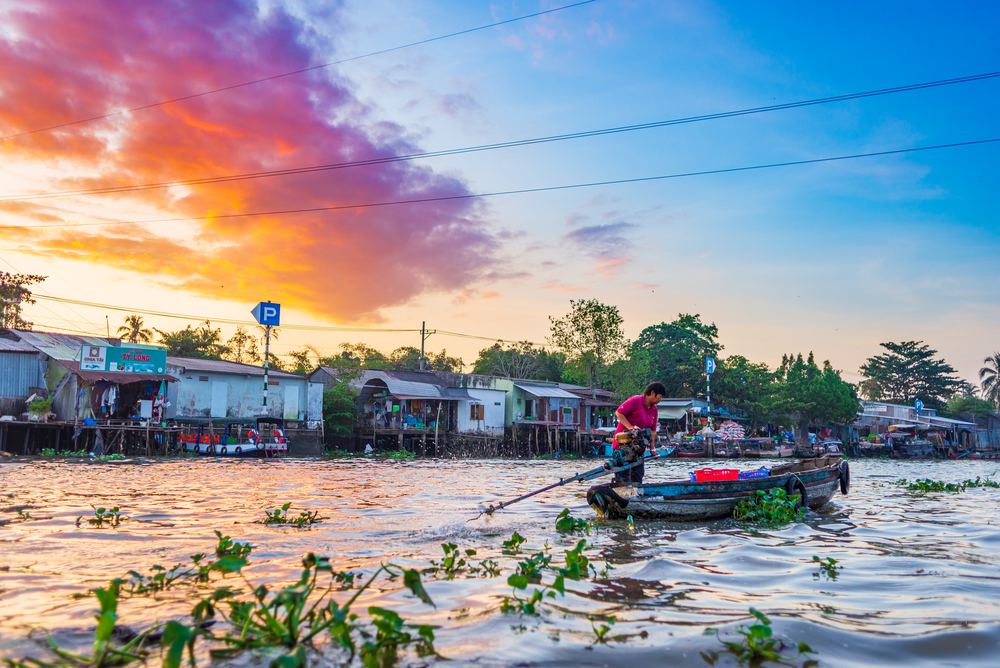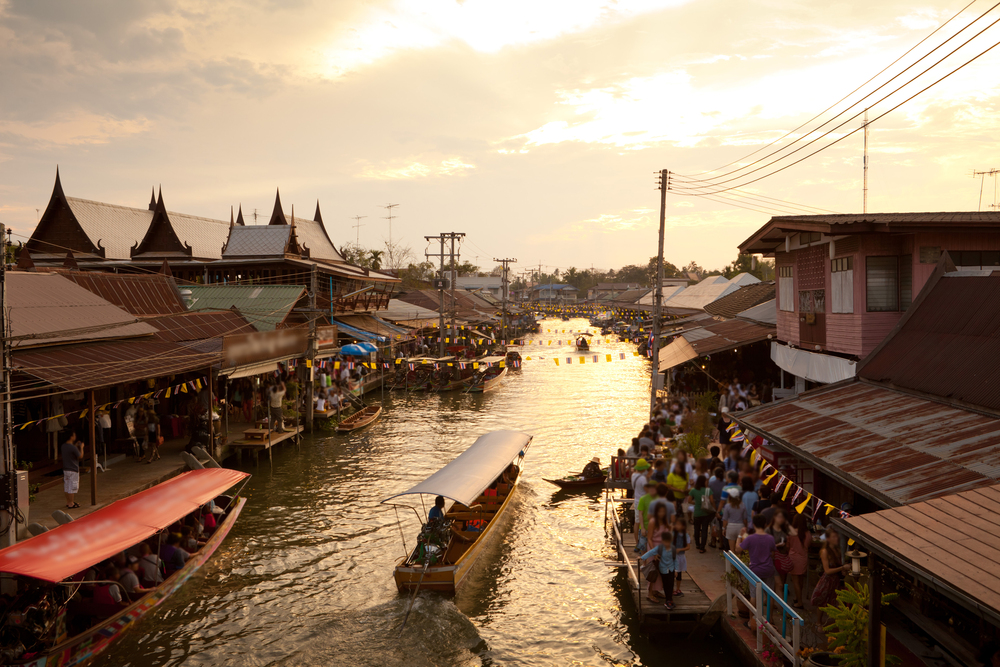Ghost towns stand as haunting reminders of human ambition, economic booms, and the inevitable cycles of rise and decline that shape civilization. These abandoned settlements tell stories of dreams pursued and fortunes lost, preserving fragments of daily life frozen in time when prosperity vanished and residents moved on to chase new opportunities elsewhere.
Here is a list of 20 ghost towns with fascinating past lives, each revealing remarkable chapters of human history through their abandoned streets and crumbling buildings
Damnoen Saduak Floating Market

The nation’s most famous floating market is located approximately 60 miles southwest of the city and has been in operation since 1867. Traders travel on narrow canals in wooden boats filled with tropical produce, vegetables, and freshly prepared Thai dishes.
The market starts early in the morning, and the finest experience is between 6 and 9 AM, when locals buy daily before the tourist crowds arrive.
Cai Rang Floating Market

Located in the Mekong Delta just outside Can Tho, Vietnam, it is the largest wholesale floating market in the region. Boats gather early in the morning, and traders display their produce on long sticks to advertise what they are offering for sale at a distance.
The market specializes in selling fresh fruit grown in the fertile delta region, including dragon fruit, rambutan, and other tropical fruits and vegetables.
Like Travel Pug’s content? Follow us on MSN.
Amphawa Floating Market

This Thai night market in Samut Songkhram province comes alive after dusk, unlike most other floating markets that operate in the morning. Street vendors sell fried fish and seafood, coconut treats, and wooden trinkets from their boats along the canal.
This weekend, the night market welcomes visitors to witness fireflies flying along the waterways at night.
Lok Baintan Floating Market

South Kalimantan’s old market in Indonesia, located beside the Martapura River, still retains its authentic local touch. Its vendors, predominantly old women dubbed ‘jukung’, travel in small boats filled with fresh produce, fruits, and local Banjarese fare.
The market typically operates from early morning to around 9 AM, serving centuries-old, river-dependent local communities.
Willemstad Floating Market

Curacao’s lively floating market takes Venezuelan vendors all the way from the mainland to sell fresh produce to locals. The vendors moor their boats at the Sha Caprileskade wharf and convert their boats into floating grocery stores.
The market is open seven days a week, offering a variety of tropical fruits, vegetables, and fish that are cheaper than imports.
Like Travel Pug’s content? Follow us on MSN.
Ganvie Floating Village Market

Constructed on stilts. Located in Benin’s Lake Nokoué, the market serves Africa’s largest lake village, home to over 20,000 residents. Sellers make round trips from door to door in dugout canoes, offering from just-caught fish in the lake to household goods and traditional crafts.
The market operates daily, supporting people who have survived on the water for over 400 years.
Xochimilco Floating Gardens

Mexico City’s floating ancient market continues to follow the Aztec tradition of chinampas, or artificial islands dedicated to cultivation. Merchants pole colorful trajineras along the network of canals, peddling flowers, plants, and traditional Mexican street foods to locals and visitors alike.
The market is one of the few pre-Columbian customs of farming and commerce that remain in existence today.
Ywama Floating Market

Myanmar’s Inle Lake is where this old market cruises between different lakeside villages on a five-day circuit. Fresh fruits and vegetables, handmade fabrics, and local goods are sold by the local Intha villagers through their special leg-rowing boats, navigating the shallow waters.
The market provides much-needed commerce for remote communities stretched across the 45-square-mile lake.
Like Travel Pug’s content? Follow us on MSN.
Dal Lake Floating Market

Kashmir’s famous lake in Srinagar hosts a unique floating market where vendors sell flowers, fruits, and vegetables, as well as Kashmiri handicraft products from shikaras. The market operates early morning when house servants from local houses row out to buy fresh vegetables and fruits for the hundreds of houseboats that are hotels.
The commerce has managed to survive despite many decades of political instability in the region.
Banjarmasin Floating Market

Indonesia’s South Kalimantan city is home to one of Indonesia’s most traditional floating markets, located along the Barito River. Indonesian women utilize klotok, traditional boats, to transport fresh fruits, vegetables, and Indonesian cuisine, such as ketupat kandangan.
The morning market begins early and slows down around mid-morning, maintaining customs over 400 years old.
Taling Chan Floating Market

Located just 7 miles from central Bangkok, this weekend market is a more relaxed version of the more popular tourist areas in town. The street vendors offer coconut water, grilled fish, and native Thai sweets from boats that line the canal.
The market also features cultural shows and traditional music, providing an authentic Thai experience that is not too crowded.
Like Travel Pug’s content? Follow us on MSN.
Mekong Delta Floating Markets

Vietnam’s widespread network of floating markets throughout the Mekong Delta region includes dozens similar to Cai Rang. Markets serve local populations with fresh produce as well as household goods, but they sell on different schedules throughout the week.
Most sell specialty goods, such as rice, fish, or tropical fruit, grown in the exceptionally fertile soil.
Pattaya Floating Market

Thailand’s artificial floating marketplace comprises four divisions, each representing a specific geographic area of the nation. While more tourist-oriented than traditional markets, it remains an operating marketplace where vendors sell regional delicacies, local crafts, and traditional commodities from floating boats.
It operates every day of the week, offering a cross-section of Thai culture and commerce in one location.
Kashmir Houseboats Market

Beyond Dal Lake, several other Kashmir lakes support floating markets that serve the famous houseboat communities. Vendors propel from elaborately trimmed houseboats selling everything from milk and newspapers to fresh flowers and ancient Kashmiri handicrafts.
The markets in Kashmir respond to the tourist economy’s yearly rhythms, while offering continuous benefits for locals.
Like Travel Pug’s content? Follow us on MSN.
Baridhara Lake Market

Baridhara Lake in Dhaka features a small yet thriving floating market where local vendors sell fresh fish, vegetables, and aquatic plants sourced from the rest of the city. The market supplies the surrounding residential areas and generates revenue for families living within the lake vicinity.
Despite the pressures of urbanization, the market persists in maintaining traditional water-based commerce in the country’s capital.
Inle Lake Floating Gardens

Outside the Ywama market, Myanmar’s Inle Lake supports numerous floating garden markets where farmers sell produce grown on man-made islands. The markets are operated informally throughout the area, with farmers paddling to individual customers or informal gathering points.
The system is an environmentally conscious agricultural and commercial system that has been engineered to accommodate the lake’s unique environment.
Amazon Floating Markets

Brazil’s Amazon River system supports numerous floating markets that serve remote villages along the long river system. Merchants travel between villages in boats loaded with commodities unavailable at faraway locations, from vegetables and fruits to industrially produced items.
Floating markets operate on irregular schedules, depending on river levels, weather conditions, and societal demand.
Like Travel Pug’s content? Follow us on MSN.
Halong Bay Floating Markets

Vietnam’s famous bay is home to small floating markets that offer services for the fishing population residing in boats and floating homes. Fresh seafood, commodities, and daily essentials are sold to families who spend their whole lives at sea by vendors.
These markets are among the most isolated and traditional floating trade still operating.
Sri Lankan Floating Markets

There are a few floating markets in Sri Lanka, particularly in the Colombo vicinity and rural areas with extensive canal systems. Early in the morning, the markets are typically held, where market vendors offer a variety of new vegetables, fish, and traditional Sri Lankan dishes.
The markets are utilized by local inhabitants and the country’s growing tourism industry.
Philippine Floating Markets

The Philippines has several floating markets, particularly in areas with extensive river systems, such as Mindanao and parts of Luzon. These operate in response to local conditions and people’s needs, selling a variety of products ranging from fresh fruit and vegetables to finished goods.
Most of them operate outside of formal arrangements, with traders adjusting to their community’s needs and seasonal fluctuations.
Like Travel Pug’s content? Follow us on MSN.
Commerce Flows On

These water markets are not just about commerce; they are also about centuries of human development living in water and the indomitable resilience of community-based commerce. At the same time, better transportation and supermarkets have transformed how most of the world shops; these water markets continue to serve their people with remarkable grit.
Many others have successfully combined the preservation of tradition with the utilitarian demands of contemporary life, demonstrating that new convenience is not incompatible with old wisdom. The fact that these markets have persisted gives us cause to hope that real cultural heritage can survive and even flourish in our speedy world=-09po8lik7u x
MMore from Travel Pug

- 20 Best Beach Towns in the Carolinas
- 13 Destinations Where Tourists Regularly Regret Their Trip
- 20 Destinations That Are More Magical Without an Itinerary
- 20 Underrated Adventures That Belong on Your Travel List
- 20 Cities Where You Should Just Wing It, No Planning Required
Like Travel Pug’s content? Follow us on MSN.N.
